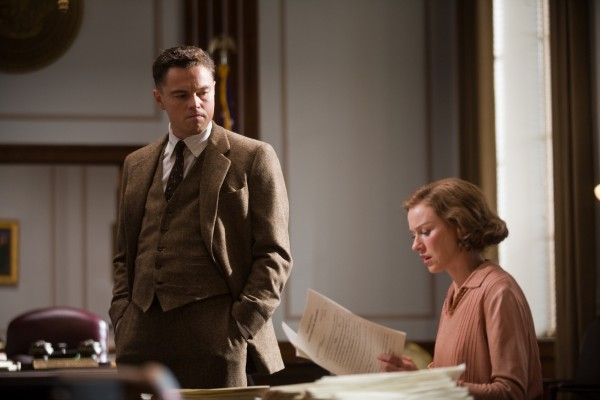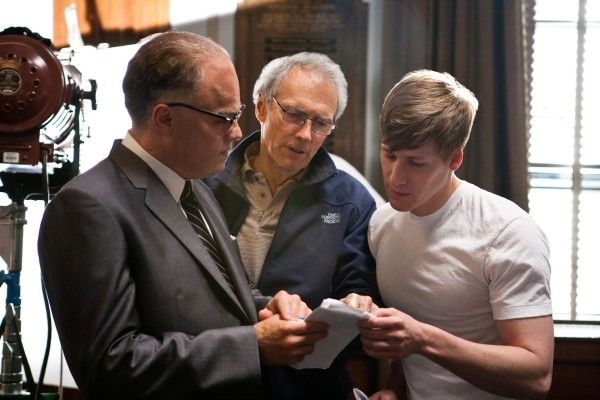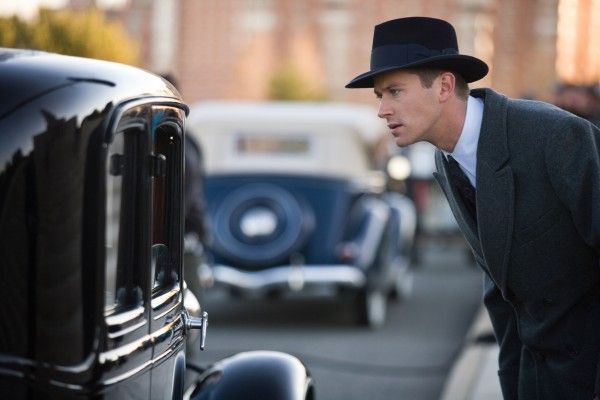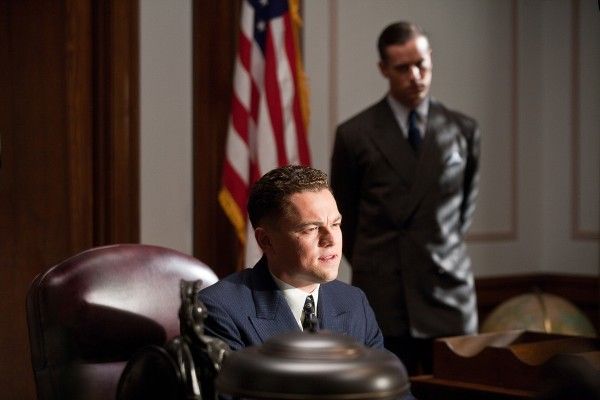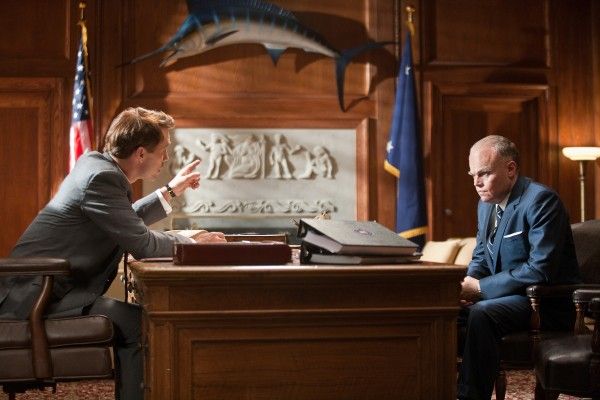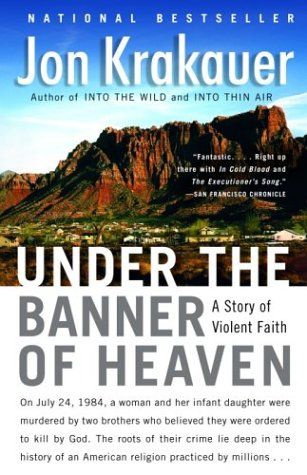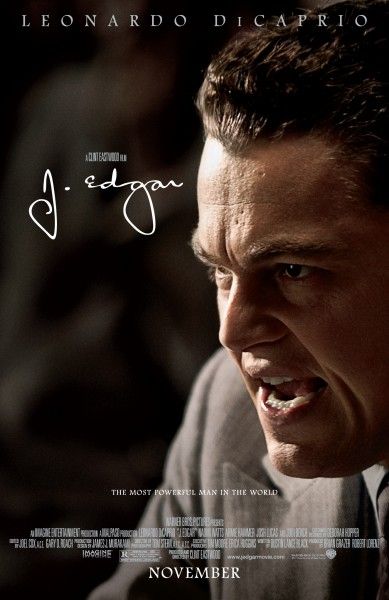With director Clint Eastwood's J. Edgar now playing in limited release, I recently got to speak with screenwriter Dustin Lance Black (Milk). Starring Leonardo DiCaprio as J. Edgar Hoover, the controversial founding director of the FBI, the film boasts a great supporting cast including Armie Hammer, Naomi Watts, Judi Dench, Josh Lucas and Ken Howard. You can watch the trailer here.During my exclusive interview, Lance Black talks about how he prepared to write the screenplay, why he wanted to tell the story, his reaction to Eastwood directing his screenplay, how they cut out a lot of the first act in the editing room, and how he wanted the script to be faithful to the truth. In addition, he talked about The Barefoot Bandit, which is based on the true story of Colton Harris-Moore, and after he finishes he’ll move on to Under the Banner of Heaven, which is based on Jon Krakauer’s nonfiction book about Mormon fundamentalists. Hit the jump for more.Here are some of the highlights from our interview:
- He had read a lot about Hoover before he began writing the script, and says all the different books about Hoover contradict each other constantly.
- He was interested in writing a movie about Hoover because after all that’s been written about him, he was left with the question of why Hoover was motivated to do everything that he did. He wanted to see if he could answer that question
- When he delivers a “first draft†to a studio it’s usually his 10th or 20th draft that he’s written, so it makes his “second draft†all the more easier.
- Since Clint Eastwood is known for sticking incredibly close to the script, Black had second thoughts about his screenplay when he heard Eastwood was interested. He sat down and talked with Eastwood about things he could change or things that could be different.
- They did more fact-checking with the help of the FBI, and DiCaprio found recordings of Hoover using animal metaphors that they incorporated into the script.
- He told producer Rob Lorenz that they should probably cut a good chunk out of the first act, but Rob told him they’d shoot it all and see what turns out well. They ended up cutting a good deal of it anyway.
- A lot of the cuts came from the first act, the Bruno Hauptmann story, and there were some cuts from the investigation.
- Black wanted the film to be incredibly faithful to the truth. The fight between DiCaprio and Hammer in the hotel room is based on accounts of the people who had rooms around them.
- He’s currently finishing up the script for The Barefoot Bandit, based on the true story of Colton Harris-Moore, after which he’ll move on to Under the Banner of Heaven based on Jon Krakauer’s nonfiction book about Mormon fundamentalists.
- He’s going to do more research for Under the Banner of Heaven. He wants to go deeper into the Lafferty boys’ murder.
Here's the full conversation. You can click here to listen to the audio.
Collider: Why J. Edgar Hoover? What got you interested?
Dustin Lance Black: He was someone I’d read a lot about. If you’re a history buff, you know about Hoover. He was likely the most powerful man in this country during the century that we were certainly the most powerful country in the world. If you start reading about him, I don’t know how much you’ve read about him, but the books contradict each other constantly. It’s really clear that they’re mostly written from a political perspective or they have some sort of an agenda.
I was often left with very little sense of the man personally. I had a sense of what he did and didn’t do and what people disagreed about whether he did this or didn’t do this or that, but I was like, “Why? Why was he doing all of this?†That was my big question. Why was he after such power? Why did he hold onto it? Why did he hold onto it so long that he started to lose his moral compass? He seemed to lose all sense of empathy. I wanted to see if we could answer that question.
Thankfully, it was on Brian Grazer’s list of interests over at Imagine. After a phone call to make sure he didn’t mean the vacuum cleaner company, I was like, “All right. Let’s look into it a little bit and see if there’s anything there that’s more human than, say, dress-wearing or being married to the FBI,†the most popular claims to date. I found some things and thought, “Boy, let’s pitch it and see if we can’t try and tell this story.â€
This is a man who was in power for so long, had so many people working under him and, as you say, there’s so much contradictory information. You obviously researched Hoover far more than most people. Why do you think there is such a contradiction in terms of the man?
Black: Well, he did do some of the more heinous things recorded in history in the 20th century. Some of the people that he black-mailed, went after and called “Communist,†made sure they were fired because they were gay, which seems awfully hypocritical, went after Martin Luther King, Jr. because of a grudge and labeled him a “Communist.†He did some of the most heinous things to some of the most beloved people in history.
On the other side, he built this crime-fighting organization that stopped some of the bombings and the domestic terror that was going on in 1919 and the 1920s and in the 1930s. He really did do great good by expanding the federal powers so that these gangsters couldn’t just drive across the state line and say, “Haha, you can’t catch me now!†which is what they were doing. They would just skirt the state lines and he was able to capture them and stop that crime spree.
So he did great good, also, and he built an organization that still does good. Some people only look at the good stuff and some people only look at the bad stuff. They have very strong opinions about it. It’s funny because I have very strong opinions on both sides and that’s what was interesting to me was, how can you have a man who can be so good and so bad, so brilliant and then so dark? Is there anything about him personally that created this, that turned him this way, that led to this? Can we address it? Maybe that will be helpful to this generation.
Something about Clint (Eastwood) I’ve heard is that he sticks very close to the script. Did that apply added pressure to make sure the dialogue was exactly the way he wanted it?
Black: I do try to deliver a solid first draft, meaning it’s my tenth or twentieth draft and then I call it “first†and hand it in, much to the chagrin of the studio sometimes when they look at the contract and go, “You’ve passed your deadline.†[laughs] It makes the second draft work all the easier.
In this case, I didn’t know it was going to be Clint, so when I found out Clint was interested it was both a blessing and bit of “Oh, boy…†There are some things I’d like to change still. I’d heard Peter Morgan say that on Hereafter, he’d had that feeling but they were already shooting. I just started to talk a little bit with Clint about things I thought could be a little bit different. We did some fact-checking, now that it was a greenlit movie and that changed some things, which was wonderful, with the help of the FBI, actually.
Then Leo [DiCaprio] was finding new recordings of Hoover where he had the best animal metaphors to describe criminals and so we started to incorporate some of that language. So I was actually able to make some changes. But it is funny because I went to Rob Lorenz and I said, “Hey, we should probably cut a good chunk out of the first act. That’s kind of everything and the kitchen sink.†And he’s like, “Well, we’ll shoot it all and we’ll see what turns out well.†And I was like, “Well, God, only working with Clint and Rob Lorenz at Warner Bros. will we ever hear that!†We did end up cutting a lot of that.
I was reading that the first cut was three hours and the release is two hours and fifteen minutes. Do you know if that material will end up on the Blu-ray or DVD or is it just gone for the ages?
Black: Oh, I have no idea. You should ask Clint or Rob, they might know that. It was all stuff…I don’t miss any of it. It was different ways of accomplishing the same goal, often times. It was what Rob said and Clint said, which was “We’ll shoot it all and see which turns out best.†So we kept the stuff that worked best.
So most of that was in the first act?
Black: A lot, yeah. A lot of the cuts are from the first act. Some of it was in the Bruno Hauptmann story. There was a good many cuts there because at a certain point it was clear enough and we didn’t want the audience to be ahead of it. There were some cuts there about the investigation. How many ways do you have to prove him guilty? There were a lot and they were all very innovative, but we stuck with Wood tracing bills, some of these other things. Now there are two or three; in truth, there were ten or twelve.
How much was “Hollywoodized†and how much is actual fact?
Black: Maybe it doesn’t always make for the most interesting movie, because I want things to be anchored in truth. I feel like, why make a biopic if it’s not somehow helping us now? There’s really no point. If it’s not informing how we can do things differently now and maybe not repeat our mistakes, than why do this piece about this person or this event? So that means, I think, anchoring things in truth.
It’s down to, say, the fight in the hotel room between these two that was based on accounts of the people who shared the rooms around them. It was common for them to go and share these suites; it didn’t just happen once,  and these fights were overheard. I want it to be that anchored. It’s why I don’t have them having sex in the movie, because I don’t know if they had sex. I don’t know. What I do know is that, with all the evidence that I found, and it’s all presented in the movie, that these guys weren’t straight. [laughs] They had every opportunity to get…the hottest women in Hollywood were throwing themselves at these guys. They’re dapper, they’re handsome in the 30s. All these biographies say, from Dorothy Lamour to Ginger and LeLa Rogers, they talk about how they wished Hoover would have responded and he didn’t.
Is “the signature at the store†a true scene?
Black: That is one of probably a half a dozen accounts I read about how he got his name. Some of them are very dull, like there just was another John E. Hoover at the Bureau when he started so he made it J. Edgar. Others talk about who he preferred, like he preferred his mom calling him this and [so on.] And then there was that one about him trying to buy a suit and his credit was bad so he changed his name there. That, to me, was the most fun. Still, there’s that account and it’s one of many.
That’s a fun scene. What are you writing right now?
Black: I’m finishing up The Barefoot Bandit, which is the feature on Colton Harris-Moore. So I’ve been spending a lot of time in Seattle. That’s almost done. And what an amazing kid. There’s so much that people don’t know about him yet. It’s heartbreaking and inspiring. It’s been a very emotional journey for me.
Once that’s wrapped up in the next couple of weeks, I get to work on Under the Banner of Heaven, with Imagine again with Ron Howard directing. You know, Mormon fundamentalists. I’m going back to my Big Love days a bit.
That’s an interesting subject.
Black: Yes, I think so. [laughs]
This is obviously after he finishes Rush?
Black: Yeah. I’ll be writing the script while he’s doing all that. It’ll take a bit. I want to go into the Lafferty boys’ murders. That’s in the book but there’s more there. Even according to [Jon] Krakauer, he has more that I want to look into and read and meet the families. Same thing, I want to come at it and really try and understand it and not just have a good guy/bad guy retelling of it.
You want to show the gray.
Black: I want to show the gray. I like the gray movies. I don’t know if audiences always…it makes them work a little harder. And they have to work hard in Hoover. But I think the gray…you learn more, if you’re willing to do it.

